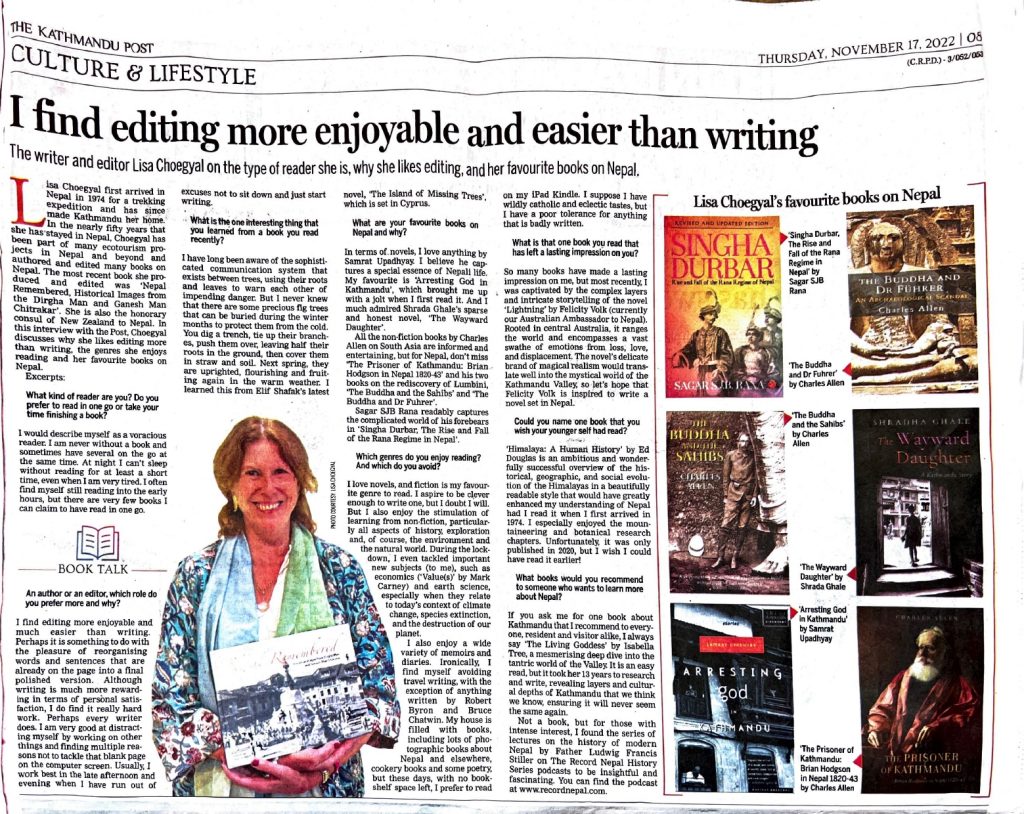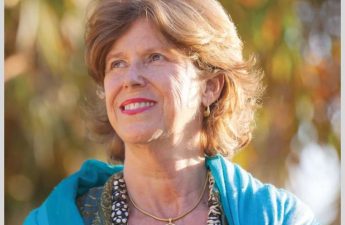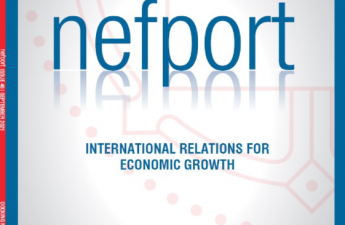Writer and editor Lisa Choegyal on the type of reader she is, why she likes editing and her favourite books on Nepal.

Lisa Choegyal first arrived in Nepal in 1974 for a trekking expedition and has since made Kathmandu her home. In the nearly fifty years that she has stayed in Nepal, Choegyal has been part of many ecotourism projects in Nepal and beyond and authored and edited many books on Nepal. The most recent book she produced and edited was ‘Nepal Remembered, Historical Images from the Dirgha Man and Ganesh Man Chitrakar’. She is also the honorary consul of New Zealand to Nepal. In this interview with the Post, Choegyal discusses why she likes editing more than writing, the genres she enjoys reading and her favorite books on Nepal.
Excerpts:
What kind of reader are you? Do you prefer to read in one go or take your time finishing a book?
I would describe myself as a voracious reader. I am never without a book and sometimes have several on the go at the same time. At night I can’t sleep without reading for at least a short time, even when I am very tired. I often find myself still reading into the early hours, but there are very few books I can claim to have read in one go.
An author or an editor, which role do you prefer more and why?
I find editing more enjoyable and much easier than writing. Perhaps it is something to do with the pleasure of reorganising words and sentences that are already on the page into a final polished version. Although writing is much more rewarding in terms of personal satisfaction, I do find it really hard work. Perhaps every writer does. I am very good at distracting myself by working on other things and finding multiple reasons not to tackle that blank page on the computer screen. Usually, I work best in the late afternoon and evening when I have run out of excuses not to sit down and just start writing.
What is the one interesting thing that you learned from a book you read recently?
I have long been aware of the sophisticated communication system that exists between trees, using their roots and leaves to warn each other of impending danger. But I never knew that there are some precious fig trees that can be buried during the winter months to protect them from the cold. You dig a trench, tie up their branches, push them over, leaving half their roots in the ground, then cover them in straw and soil. Next spring, they are uprighted, flourishing and fruiting again in the warm weather. I learned this from Elif Shafak’s latest novel, ‘The Island of Missing Trees’, which is set in Cyprus.
Which genres do you enjoy reading? And which do you avoid?
I love novels, and fiction is my favourite genre to read. I aspire to be clever enough to write one, but I doubt I will. But I also enjoy the stimulation of learning from non-fiction, particularly all aspects of history, exploration and, of course, the environment and the natural world. During the lockdown, I even tackled important new subjects (to me), such as economics (‘Value(s)’ by Mark Carney) and earth science, especially when they relate to today’s context of climate change, species extinction, and the destruction of our planet.
I also enjoy a wide variety of memoirs and diaries. Ironically, I find myself avoiding travel writing, with the exception of anything written by Robert Byron and Bruce Chatwin. My house is filled with books, including lots of photographic books about Nepal and elsewhere, cookery books and some poetry, but these days, with no bookshelf space left, I prefer to read on my iPad Kindle. I suppose I have wildly catholic and eclectic tastes, but I have a poor tolerance for anything that is badly written.
What is that one book you read that has left a lasting impression on you?
So many books have made a lasting impression on me, but most recently, I was captivated by the complex layers and intricate storytelling of the novel ‘Lightning’ by Felicity Volk (currently our Australian Ambassador to Nepal). Rooted in central Australia, it ranges the world and encompasses a vast swathe of emotions from loss, love, and displacement. The novel’s delicate brand of magical realism would translate well into the mystical world of the Kathmandu Valley, so let’s hope that Felicity Volk is inspired to write a novel set in Nepal.
Could you name one book that you wish your younger self had read?
‘Himalaya: A Human History’ by Ed Douglas is an ambitious and wonderfully successful overview of the historical, geographic, and social evolution of the Himalayas in a beautifully readable style that would have greatly enhanced my understanding of Nepal had I read it when I first arrived in 1974. I especially enjoyed the mountaineering and botanical research chapters. Unfortunately, it was only published in 2020, but I wish I could have read it earlier!
What are your favourite books on Nepal and why?
In terms of novels, I love anything by Samrat Upadhyay. I believe he captures a special essence of Nepali life. My favourite is ‘Arresting God in Kathmandu’, which brought me up with a jolt when I first read it. And I much admired Shrada Ghale’s sparse and honest novel, ‘The Wayward Daughter’.
All the non-fiction books by Charles Allen on South Asia are informed and entertaining, but for Nepal, don’t miss ‘The Prisoner of Kathmandu: Brian Hodgson in Nepal 1820-43’ and his two books on the rediscovery of Lumbini, ‘The Buddha and the Sahibs’ and ‘The Buddha and Dr Fuhrer’.
Sagar SJB Rana readably captures the complicated world of his forebears in ‘Singha Durbar, The Rise and Fall of the Rana Regime in Nepal’.
I relish the exquisitely spare poetry in ‘Night’ by Sulochana and translated by Muna Gurung.
What books would you recommend to someone who wants to learn more about Nepal?
If you ask me for one book about Kathmandu that I recommend to everyone, resident and visitor alike, I always say ‘The Living Goddess’ by Isabella Tree, a mesmerising deep dive into the tantric world of the Valley. It is an easy read, but it took her 13 years to research and write, revealing layers and cultural depths of Kathmandu that we think we know, ensuring it will never seem the same again.
Not a book, but for those with intense interest, I found the series of lectures on the history of modern Nepal by Father Ludwig Francis Stiller on The Record Nepal History Series podcasts to be insightful and fascinating. You can find the podcast at www.recordnepal.com.


